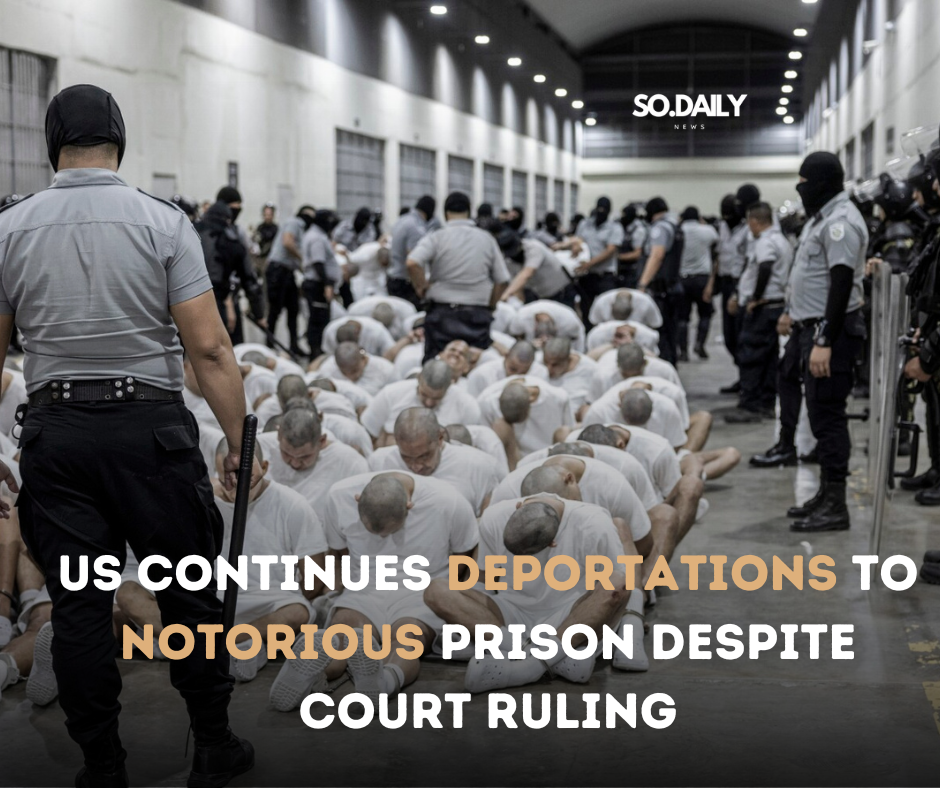The U.S. government has recently deported nearly 300 Venezuelan migrants to El Salvador, despite a court order temporarily blocking such actions. This move has sparked outrage among human rights organizations, legal experts, and immigration advocates who argue that the deportations violate due process and constitutional protections.
The administration justified these deportations by invoking the Alien Enemies Act of 1798, a rarely used law that grants the president broad authority to expel foreign nationals during times of conflict. Officials claimed that the individuals deported were members of the Tren de Aragua, a notorious criminal organization involved in drug trafficking, extortion, and violent crimes across Latin America. However, many of those deported were sent away without a fair trial or proper legal representation, raising concerns that innocent people may have been misidentified as gang members.
El Salvador’s Role and the Notorious Cecot Prison
El Salvador has agreed to accept these deportees as part of a multi-million dollar deal with the U.S. government. Under the agreement, those accused of gang affiliation will be housed in the Cecot maximum-security prison, widely regarded as one of the harshest detention facilities in the world. The prison, built under the leadership of Salvadoran President Nayib Bukele, is designed to hold tens of thousands of gang members and is known for its extreme conditions, lack of basic human rights protections, and indefinite detainment of suspects without trial.
According to reports, the U.S. will pay approximately $6 million annually for each group of 300 individuals deported to El Salvador. This arrangement aligns with President Bukele’s aggressive crackdown on gang violence, which has led to a significant drop in crime rates but has also drawn criticism for its heavy-handed tactics and alleged human rights abuses. Detainees in Cecot are subjected to inhumane conditions, with reports of overcrowding, lack of medical care, and severe restrictions on communication with family members or legal counsel.
Defying a Federal Court Order
What makes these deportations particularly controversial is that they proceeded despite a federal judge’s order to halt them. The court had issued a temporary injunction, stating that the government could not continue deportations under the Alien Enemies Act until a full legal review had been conducted. However, the administration argued that the judge’s verbal ruling was non-binding and insisted that once individuals were placed on deportation flights, they were no longer under U.S. jurisdiction.
Legal experts warn that this defiance sets a dangerous precedent. The U.S. government’s decision to ignore a court order raises serious questions about the separation of powers, constitutional governance, and the rule of law. If the executive branch can sidestep judicial rulings at will, what prevents it from doing so in other areas of policy? Critics argue that this move represents an erosion of democratic norms and could have far-reaching consequences beyond immigration policy.
The Broader Impact on Constitutional Rights
Opponents of the deportations argue that they represent a broader shift toward authoritarian-style governance, where executive actions are carried out without regard for legal oversight. Many fear that if such actions go unchecked by Congress or the courts, they could set a precedent that extends beyond immigrants, potentially affecting broader civil rights protections for all U.S. residents.
With allies of the administration controlling both legislative chambers, the likelihood of any formal pushback—such as impeachment or congressional investigations—remains low. This has further fueled concerns that the checks and balances designed to protect against government overreach are weakening.
The Human Cost of the Policy
While the administration insists that these deportations are necessary for national security, the reality on the ground tells a more complex story. Many of those deported have lived in the U.S. for years, with families, jobs, and no prior criminal records. Some individuals were reportedly deported with little more than the clothes on their backs, left to fend for themselves in a country where they have no support network and face the risk of indefinite detention.
Families of the deported individuals have expressed fear and heartbreak, describing how their loved ones were taken without warning and sent to a country where they may never be seen again. Immigration attorneys working on these cases report that many detainees had pending asylum claims or legal appeals that were ignored in the rush to deport them.
The Future of U.S. Immigration Policy
As the legal battle over these deportations continues, the case raises larger questions about the future of U.S. immigration policy. Should the government have the power to deport individuals without due process? How can the rights of immigrants be protected while ensuring national security? And what role should international human rights standards play in shaping U.S. policy?
For now, the deportations continue, despite widespread opposition and ongoing legal challenges. But one thing is clear—this issue is far from over. Immigration rights groups, civil liberties organizations, and lawmakers who oppose the policy have vowed to keep fighting, warning that the consequences of these actions will be felt for years to come.
